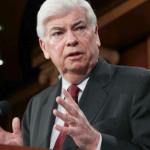Waiting for D.C. to Catch Up to Wall Street
 Many of our current financial regulations no longer reflect the realities of modern finance. Republicans need to put aside partisan bickering and work with Senator Dodd on passing a comprehensive financial reform package.
Many of our current financial regulations no longer reflect the realities of modern finance. Republicans need to put aside partisan bickering and work with Senator Dodd on passing a comprehensive financial reform package.
Sen. Chris Dodd’s decision to push forward a financial regulatory reform proposal without any Republican support shows how toxic Washington’s policy-making environment has become. While real differences exist between Senate Democrats and Republicans on a variety of issues, there’s a surprisingly broad agreement on the basics of financial services reform. In fact, Dodd’s decision—while partly borne of frustration—says at least as much about partisan bickering as it does about any substantive public policy issue. If either Dodd or his Republican counterparts will let it happen, enough agreement exists to let substantive financial services reform pass the Senate overwhelmingly.
While plenty of people have fallen into ideological traps of the left (“it was all evil corporations and Dick Cheney”) and right (“ACORN, Nancy Pelosi, and the Community Reinvestment Act caused the financial crisis”), most keen observers can discern a mélange of public and private actions. The facts are pretty clear: Many of the biggest mistakes happened in the private sector but taxpayers had little choice but as to bailout rich people and big corporations that had taken stupid risks; A number of institutions really were “too big to fail;” The government did too much when it forced capital into too few markets and too little when it failed to notice real systemic risks.
As a result, senators on the left and the right could reach an agreement that would go something like this: major financial services conglomerates don’t really “fit” any existing regulator; those wishing to play in the word of lightly-regulated exotic investment shouldn’t ever be able to demand taxpayer bailouts again; many of the current legal distinctions between types of institutions reflect mid-20th century corporate structures that don’t reflect modern reality.
This isn’t to say that every good idea with bipartisan support can be called a consensus. For instance, a well-designed national insurance regulator would do a lot of good but, right now, probably couldn’t muster a majority of votes in either the House or the Senate.
But rather than wrangling over issues like this, many of the biggest disputes now roiling the Senate seem to fit medieval scholastics better than members of what’s supposedly the world’s greatest deliberative body. For example, can anyone really be sure if it’s best to structure a new “systemic” regulator for “too big to fail” institutions as a fully independent agency (as many on the Left prefer), a largely autonomous bureau within the Federal Reserve (as Dodd and the Obama administration favor), or an office within Treasury (as Republicans want)? Likewise, while proposals to let small groups force more proxy votes may provide opportunities for special interests to ventilate on their favorite issues, they’re not all that important. Shareholders invest to make money and, unless they can make sound cases about how their proposals will improve profits, labor unions, environmentalists, and religious activists are going to find themselves soundly outvoted time after time even if they get more opportunities to make noise.
All that said, Dodd has clearly overreached and given in to his own party’s Left: parts of his plan ranging from the new taxes that are designed to pre-fund future bailouts to proposals for heavy-handed regulation of credit default swap markets will do far more harm than good. It would be best if Dodd’s current plan didn’t pass intact.
But much of what Dodd proposes isn’t all that bad and really shouldn’t arouse significant dispute. Assuming it can get past the continuous partisan wrangling, indeed, enough common ground seems to exist for the Senate to agree on a substantive, meaningful, financial reform package.